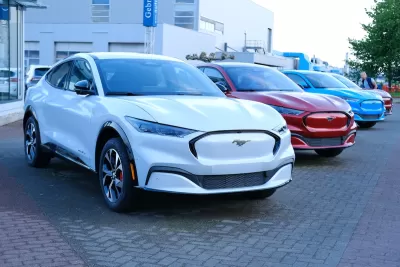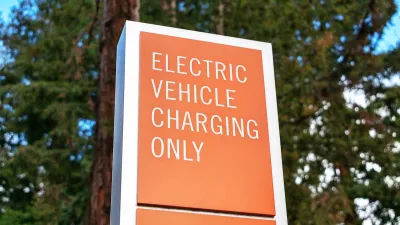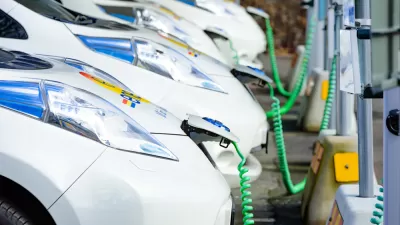Trump’s proposal to eliminate the federal electric vehicle credit could have severe repercussions for the domestic auto industry.

In a Forbes article, Andrew Leahey explains why eliminating the federal electric vehicle tax credit would be “a huge mistake” and “a major setback for the American automotive industry.”
According to Leahey, removing the tax credit — which he calls “a strategic investment in the future of American industry, innovation, and sustainability” — would put U.S. automakers further behind in the shift to electric vehicles and make them less competitive. “Without comparable support, US automakers face the challenge of both competing with lower-priced foreign EVs and covering the high upfront costs of EV research and development (R&D) —without the benefit of subsidies.”
Leahey explains that the move would only harm U.S. innovation and jobs and allow competitors to gain market share. “By eliminating the EV tax credit, the Trump administration risks pulling the rug out from under domestic EV manufacturers.” It would also limit the growth of “high-quality, future-focused jobs” in the sector.
The only automaker who could stand to benefit from the loss of the tax credit is Tesla, while legacy carmakers like Ford and small companies like Rivian would suffer, leading to fewer options for buyers and less innovation in the industry. For Leahey, “If the goal is to foster a robust American EV marketplace, eliminating the credit is not the answer.”
FULL STORY: Eliminating The Electric Vehicle Tax Credit Would Be A Huge Mistake

Study: Maui’s Plan to Convert Vacation Rentals to Long-Term Housing Could Cause Nearly $1 Billion Economic Loss
The plan would reduce visitor accommodation by 25,% resulting in 1,900 jobs lost.

Alabama: Trump Terminates Settlements for Black Communities Harmed By Raw Sewage
Trump deemed the landmark civil rights agreement “illegal DEI and environmental justice policy.”

Why Should We Subsidize Public Transportation?
Many public transit agencies face financial stress due to rising costs, declining fare revenue, and declining subsidies. Transit advocates must provide a strong business case for increasing public transit funding.

Paris Bike Boom Leads to Steep Drop in Air Pollution
The French city’s air quality has improved dramatically in the past 20 years, coinciding with a growth in cycling.

Why Housing Costs More to Build in California Than in Texas
Hard costs like labor and materials combined with ‘soft’ costs such as permitting make building in the San Francisco Bay Area almost three times as costly as in Texas cities.

San Diego County Sees a Rise in Urban Coyotes
San Diego County experiences a rise in urban coyotes, as sightings become prevalent throughout its urban neighbourhoods and surrounding areas.
Urban Design for Planners 1: Software Tools
This six-course series explores essential urban design concepts using open source software and equips planners with the tools they need to participate fully in the urban design process.
Planning for Universal Design
Learn the tools for implementing Universal Design in planning regulations.
Smith Gee Studio
Alamo Area Metropolitan Planning Organization
City of Santa Clarita
Institute for Housing and Urban Development Studies (IHS)
City of Grandview
Harvard GSD Executive Education
Toledo-Lucas County Plan Commissions
Salt Lake City
NYU Wagner Graduate School of Public Service





























